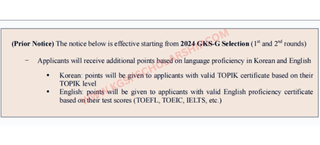Dreaming of studying in South Korea for free The GKS Scholarship 2026 also known as the KGSP is your chance to begin a fully funded academic journey. This opportunity is offered by the Government of South Korea together with the National Institute for International Education.
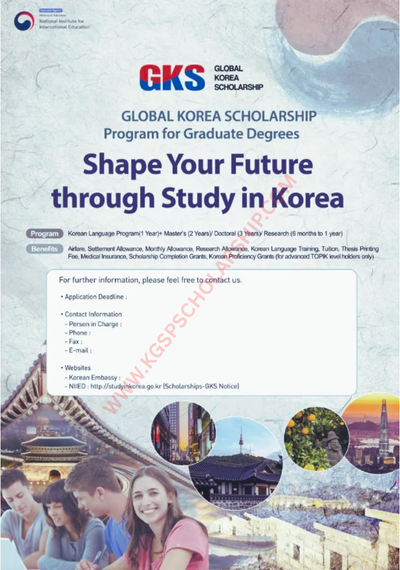
Through the Global Korea Scholarship previously called the Korean Government Scholarship Program students from around the world can apply for Master’s, Doctoral and research programs at top universities in South Korea. In 2026 around 1378 students from 154 countries are expected to be chosen with all expenses paid for the entire duration of their studies.
1. Program Goal
The goal of the Global Korea Scholarship is to give international students a chance to study for advanced degrees at top universities in South Korea. The program promotes academic exchange and cultural understanding to build strong connections and lasting friendships between South Korea and countries around the world.
1b – GKS Scholarship Benefits
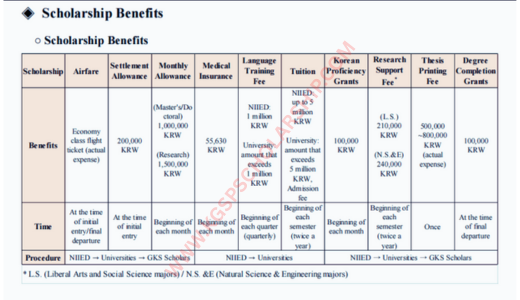
Private Health Insurance (Arrival Phase): Scholars will receive 20,000 KRW per month from NIIED to cover private insurance until they are enrolled in the national health insurance system.
Standard Health Insurance: After enrollment in the national health insurance system, NIIED will provide a monthly premium of 55,630 KRW.
Additional Benefits for Degree Program Scholars Only:
- Korean proficiency grant (for TOPIK Level 5 or 6 holders)
- Research support fee
- Full tuition coverage
- Thesis printing cost reimbursement
- Degree completion grant
2 – Available Programs and Participating Universities
The Global Korea Scholarship (GKS) currently offers opportunities for international students to pursue the following academic tracks at Korean universities:
- Master’s Degree Programs
- Doctoral (Ph.D.) Degree Programs
- Non-Degree Research Programs
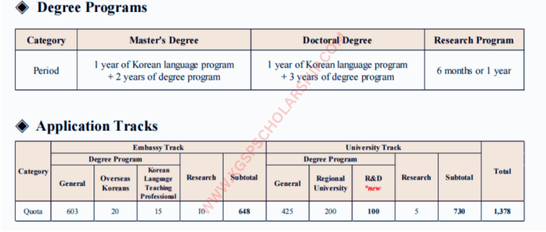
3 – Available Fields of Study and Universities
Applicants can only apply to the universities and study programs listed in the official University Information file. This document is shared with the GKS announcement on the Study in Korea website and gives full details on available fields of study degree options and what each university requires.
If you are applying through the Embassy Track make sure to choose from the universities that are allowed for this track. These are clearly marked in the same University Information file.
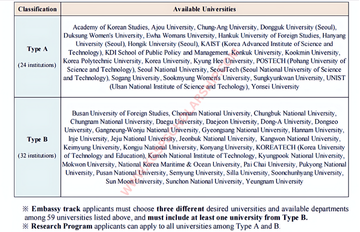
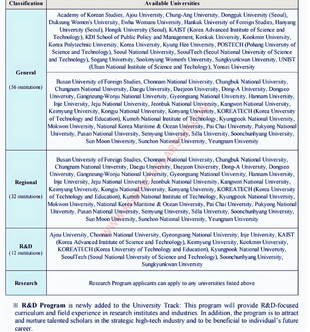
4 – Embassy Track Quota (GKS Scholarship 2026):
- Total General Category Slots: 737 scholars
- Eligible Countries/Regions: 147
- Selection Channel: Embassy Track
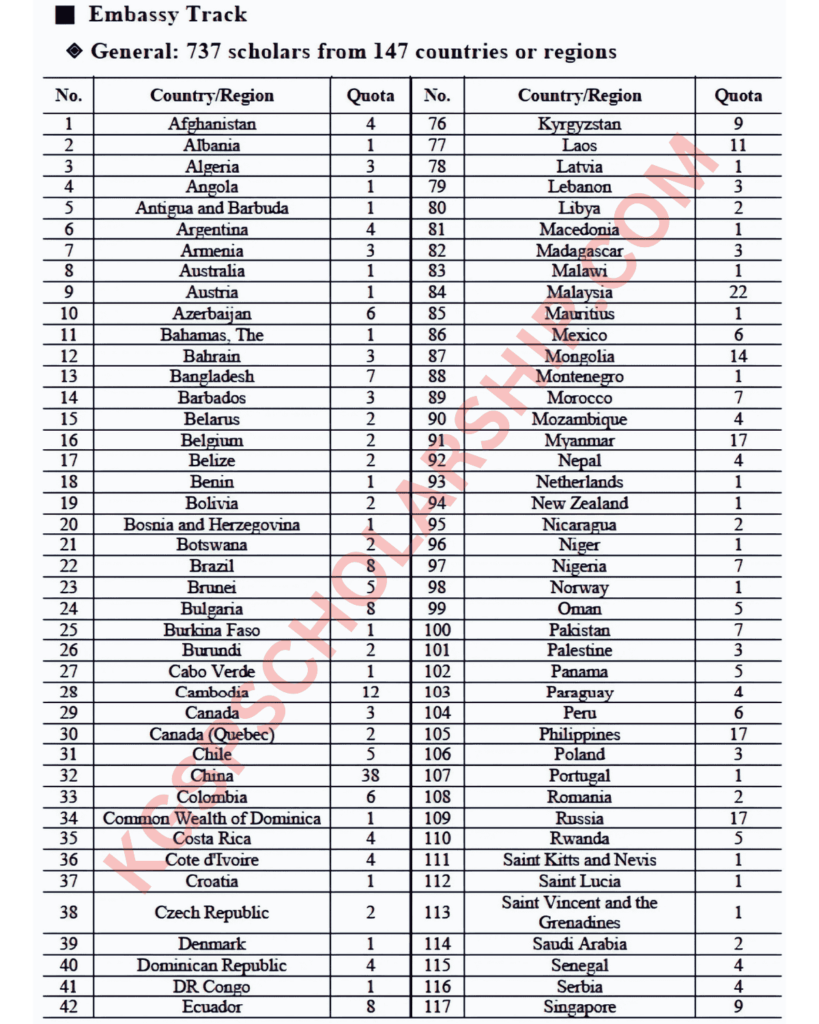

5 – University Track Quota (GKS 2026) KGSP
- Total Slots (University Track): 1,400 scholars
- General Category:
- 375 scholars
- From 57 countries/regions
- Regional – GKS (R-GKS) Category:
- 630 scholars
- From 59 countries/regions

6 – Eligibility Criteria (KGSP 2026)
a) Nationality
- Applicants must hold citizenship of countries invited by NIIED to participate in the GKS program.
- Neither applicants nor their parents should hold Korean citizenship.
- Dual citizenship holders (including Korean citizenship) are not eligible to apply.
b) Degree Requirements
- Master’s Program: Must have a bachelor’s degree or equivalent/higher qualification.
- Doctoral Program: Must have a master’s degree or equivalent/higher qualification.
c) Academic Performance
- Minimum CGPA thresholds:
- 2.64/4.0
- 2.80/4.3
- 2.91/4.5
- 3.23/5.0 OR
- Must be in the top 20% of one’s class or hold a minimum of 80% on a 100-point scale.
d) Age
- Applicants must be under 40 years of age (born after September 1, 1982).
e) Health
- Applicants must be in good physical and mental health to study in Korea for the full duration of the program.
7 – Important Things to Remember
- One Track Policy: Applicants are allowed to apply for only one track—either the Embassy Track or the University Track.
- Embassy Track Applicants: Must choose only one of the following program types:
- General
- Overseas Koreans Adoptee
- Korean Language Teaching Professional
- Research Program
- University Track Applicants: Must choose only one of the following program types:
- General
- Regional University
- R&D Program
- Research Program Additionally, applicants can only apply to one university and one department.
- Disqualification Rule: Applications submitted to multiple tracks or universities will be disregarded during the second round of the selection process.
8 – Document Submission Guidelines for GKS Scholarship 2026
- Application deadlines are different for each embassy and university. You need to check the exact deadline with the institution you are applying to before you submit your documents.
- Each embassy or university may have its own way of accepting documents. Be sure to follow the instructions given by your chosen institution to avoid any issues with your application.
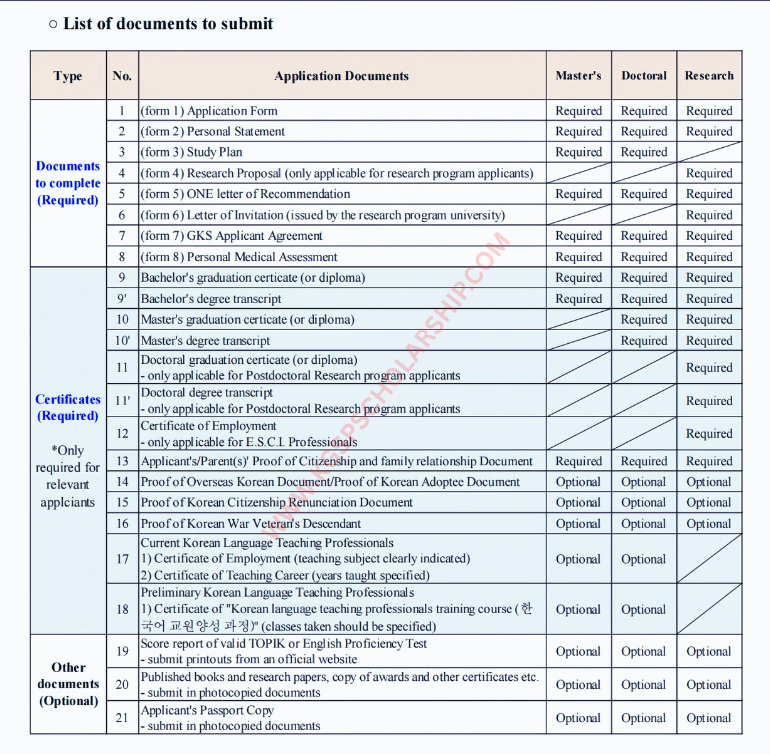
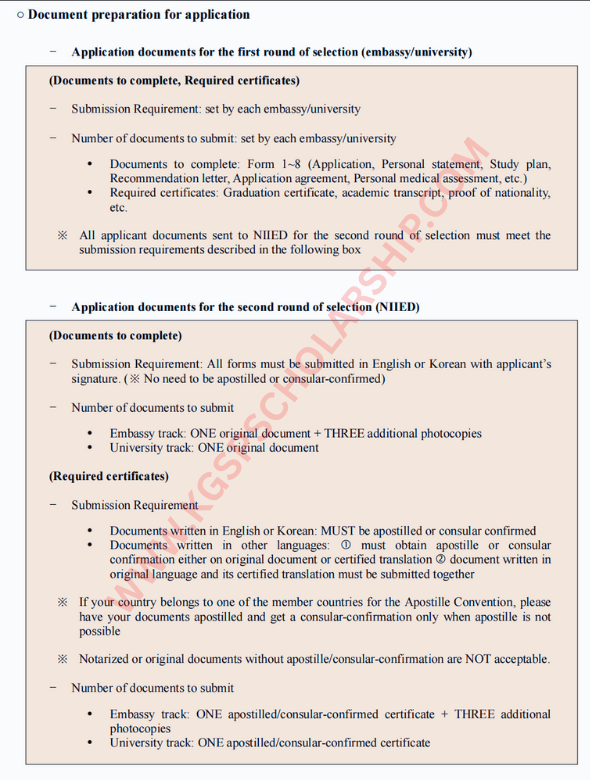
9 – Selection Procedure
- Track Limitation: Applicants must choose only one application track: either the Embassy Track or the University Track. Applying through both will result in disqualification.
- Embassy Track Process:
- Submit application to the relevant Korean Embassy in your country.
- The embassy conducts the first round of selection.
- Shortlisted candidates are recommended to NIIED for the second round of evaluation.
- Final selections are made and scholars are matched with universities.
- University Track Process:
- Submit application directly to a designated Korean university.
- The university conducts the first round of selection.
- Shortlisted applicants are nominated to NIIED for final review.
- NIIED makes the final decision and offers scholarship confirmation.
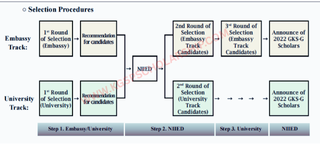
10 – Selection Schedule and Timeline
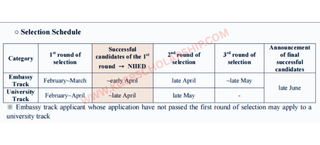
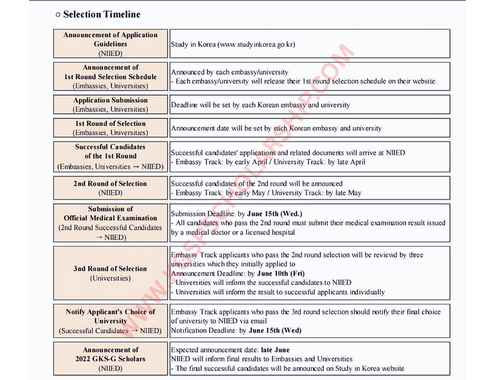
11 – Important Notes on Application
Submission and Evaluation for GKS
Application Submission Guidelines:
- All documents must be in English/Korean.
- Institution-Specific Guidelines: Each embassy or university may have its own rules (like simplified documents) so check their instructions carefully.
Embassy Track
- University Selection: You can pick up to three universities.
- Department Choice Rule: You can apply to the same department in all three universities but not different departments in one university.
- Type B University Requirement: At least one of your three choices must be a Type B university.
- Highly Competitive Universities Warning: If you choose all three universities from highly competitive ones there’s no guarantee of final selection even if you pass the second round. Past years show many applicants were not accepted by any of their chosen universities (33 in 2016 34 in 2017 41 in 2018 39 in 2019 52 in 2020 and 53 in 2025).
University Track
- You can apply to only one university and one department.
12 – Evaluation Preference Criteria
Some applicants may get special consideration or extra points:
- Overseas Koreans.
- Those from low-income families or difficult backgrounds.
- Applicants to Natural Science and Engineering departments at Regional universities.
- University professors in Natural Science & Engineering or from ODA recipient countries.
- Postdoctoral Research Program applicants in Natural Science and Engineering.
- Applicants with high English test scores (TOEFL, TOEIC, IELTS).
Additional Points
- TOPIK Level 3+: +10% bonus
- Korean War Veteran Descendants: +5% bonus
- Korean/English Language Certificates: Extra points from 2026 onward
